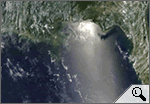|
|
|
|
 |
 |
 > Obama addresses the nation > Time for renewable energy > 'Struggle in the Niger Delta' dijous, 17 de juny de 2010
It will soon be two months since the explosion and subsequent sinking of the Deepwater Horizon, an oil rig that was leased to the British company BP in the Gulf of Mexico, some 60 km off the US coast.
The accident left 11 dead and led to an oil spill that has released massive quantities of oil into the sea. The most recent estimates, which are the most pessimistic, indicate that the daily spill is between 35,000 and 60,000 barrels a day. Needless to say, the oil spill has had serious consequences for the area's fishing and tourism industries. The impact on the environment is still difficult to quantify. However, that has not stopped the US government from declaring the spill the worst ecological disaster in the history of the United States. The country's president, Barack Obama, who has been criticised for not having acted decisively enough, has demanded that BP set up a fund to compensate affected workers and businesses.
Obama addresses the nationThe problem is so serious that, on Tuesday night, President Obama addressed the nation for the first time from the Oval Office of the White House, something that is only done in exceptional cases. In his televised address, the president promised to do everything necessary to help people in the Gulf of Mexico to recover from the tragedy. He said efforts in the coming weeks should capture up to 90% of the oil leaking out of the well. However, he added that combating the situation would take months or even years.
Time for renewable energyPresident Obama also said that now was the time to strongly promote the use of renewable energy, to put an end to the addiction to fossil fuels, which are polluting and finite. To conclude, the president added that the United States consumes 20% of the world's oil, despite having very little of its own: less than 2% of reserves. Reducing dependence on oil and polluting energy was part of Obama's election manifesto.
'Struggle in the Niger Delta'
+ The dramatic situation in the Delta has been covered by the Catalan journalist Xavier Montanyà.
Unfortunately, there are oil spills that receive very little media coverage. The prime example is the Niger Delta. The Niger is the third-longest river in Africa, after the Nile and the Congo. It is said that the Niger Delta, home to some 40 ethnic groups, is the world capital of oil pollution, on account of the repeated oil spills that have taken place over recent years. The dramatic situation there has been covered by the Catalan journalist Xavier Montanyà in his series entitled 'La lluita del delta del Níger' ('Struggle in the Niger Delta'), published by VilaWeb in May.
|
Investiga

> La taca de petroli del golf de Mèxic: mapa interactiu.

> Perfil de la petroliera BP.
I també...
- Les conseqüències de l'explotació petroliera del delta del Níger, vistes per Xavier Montanyà.
- Sobre l'impacte d'un vessament de petroli.
- Les energies renovables, una a una.
Portada |
Europa Press |
El Punt |
La premsa |
Especials |
Diari de l'escola |
LesFinances.info |
Editorials |
Mail obert |
Els blocs |
Lletres
Tecnologia i ciència | Solidaritat | Cap de 7mana | Campus | El 9 | Presència | Fòrums | Enquestes | Xat | Correu
Traductor | Edicions en Pdf | Wap-pda | Biblioteca | Lletra més grossa
Tecnologia i ciència | Solidaritat | Cap de 7mana | Campus | El 9 | Presència | Fòrums | Enquestes | Xat | Correu
Traductor | Edicions en Pdf | Wap-pda | Biblioteca | Lletra més grossa
| Què és VilaWeb? Publicitat Mapa web Contacte | Una web de Partal, Maresma i Associats, S.L. |





